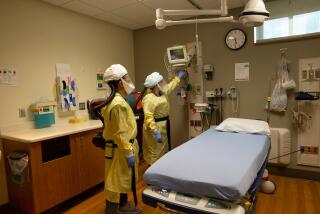Parental Instinct in Its Fullest Glory : Is it morally acceptable not to try to save a life? The Ayalas answered that nobly
- Share via
The most useful discussions of ethics occur in the context of behavior that fails to meet the moral standards that society demands, or should demand, of citizens and institutions.
It may well be that meeting high standards is what imparts dignity to human beings. Just as surely, lapses strip away that dignity.
Against that background, we were baffled by questions of ethics that have been raised in the case of the Ayala family of Walnut, Calif. Baffled because we found nothing in the story but generosity, selflessness, love and dignity on a plane seldom encountered these days.
To us, the Ayala story was a perfect example of an 18th-Century definition of true morality: “To enjoy and give enjoyment, without injury to yourself or others. . . . “
There was, of course, an unavoidable risk of injury, both to self and to others.
There certainly was risk for 19-year-old Anissa Ayala, suffering from an often fatal form of leukemia. A national search failed to turn up a compatible donor of bone marrow that Anissa needed in order to have a reasonable chance of long life.
There was risk for her mother, Mary, who, when that search failed, agreed at age 43 to conceive a child whose bone marrow might be a match for Anissa’s. She took that risk even though doctors advised the Ayalas that there was only one chance in four that another sibling’s bone marrow could be used in an effort to save Anissa’s life. There was risk for Abe Ayala, who underwent surgery to reverse an earlier vasectomy. There was risk for Marissa, who was born in April of last year and who, last Tuesday, underwent surgery to donate bone marrow to her older sister.
This was not the first time a couple had conceived a child in response to such a medical crisis. But it was the first time a family had declared its purpose publicly, and medical ethicists began asking hypothetical questions: If prenatal tests found a fetus’ bone marrow unsuitable, would a couple decide on an abortion? What if a donating child suffers from psychological trauma as the years go by as a result of the marrow transplant?
Society’s concern about moral standards requires forcing people to look exactly these questions in the face in such circumstances. But ethics is a matter of do’s and don’ts.
And it seems to us that society must ask the same question that the Ayalas faced, it appears, so nobly: Is it morally acceptable not to try to save a life when there is a way that might be done?
The Ayalas answered in the only way that was ethically acceptable to them. Society can ask no more.


